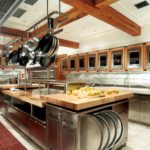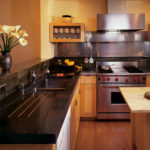CHOOSING A KITCHEN COUNTERTOP
There are a lot of options for kitchen countertops, all have positive and negative aspects.Below is a list of the different types available, please note that the price can vary dramatically depending on the origin of the stone, the company that will fabricate it and the company that will install it.
1. Granite Counters ($40-250 per sq. ft.)
Granite is the countertop material of choice when there are no other things to think about – like money. It defines elegance in a kitchen. The beauty of the stone contributes to the beauty of even the most modest kitchen.
Pros: holds up to heat; comes in beautiful colors; looks permanent and substantial.
Cons: very expensive, requires lots of maintenance, including periodic sealing; absorbs stains; can crack; limited range of colors available.
Eco-Friendly: Very low. Not renewable. Once it is removed from the earth is cannot be easily reused. Be sure to use low-VOC sealant, look for a source that is near you to cut down on transportation, and seek out remnant slabs.
2. Engineered Stone ($60-180 per sq. ft.)
Engineered stone is composed of quartz particles. It is available in a larger range of colors than granite and has a nonporous surface that resists scratches. It’s easy to maintain, without the annual sealing required by natural stone. Brands on the market are DuPont Zodiaq®, Cambria Quartz, and Silestone.
Pros: resistant to stain and acid; easy care.
Cons: Expensive.
Eco-Friendly: Usage of color pigments and resin don’t make this product super friendly. Mining of the quartz clearly has an impact on the environment.
 3. Solid Surface ($75-120 per sq. ft.)
3. Solid Surface ($75-120 per sq. ft.)
Because solid surface counters are just what they’re called, solid, any scratches can be sanded out. The countertops are custom-made to your specifications by companies such as Avonite, Corian, and Swanstone.
Pros: comes in a rainbow of colors and patterns; seamless; stain resistant.
Cons vulnerable to hot pans and stains which can damage the surface; can be moderately expensive.
Eco-Friendly: No-VOCs, but the jury is out. Clearly not as green as products such as IceStone, otherwise they would have the certifications like those of IceStone.
4. Ceramic Tile ($20-75 per sq. ft.)
Ceramic tile is durable and easy to clean. Add to that inexpensive and you’ve got a really good choice for countertops for the average home. Because it’s installed a section at a time, it can be done by most resourceful homeowners.
Pros: takes hot pans; easy to clean; wide range of price, color, texture and design.
Cons: counter surface is uneven; tiles can easily chip or crack; grout lines become stained; custom-designed tiles are very expensive.
Eco-Friendly: Some ceramic tile is made from recycled content such as old lightbulbs, bottles and porcelain. It is biodegradable, and use low-VOC adhesive.
5. Laminates ($20-50 per sq. ft.)
Laminate counters bear trademarks such as Formica, Nevamar, and Wilsonart. They’re made of plastic-coated synthetics with a smooth surface that’s easy to clean. The pieces are cut to size and finished on the ends.
Pros: you can buy laminates in lots of colors; easy to maintain; durable; inexpensive.
Cons: scratches and chips are almost impossible to repair; seans show; end finishing and front edge choices can be pricey.
Eco-Friendly: Resins used may include urea formaldehyde, look for laminates that advertise that they do NOT.  Also look for the use of recycled plastic.
 6. Wood or Butcher Block ($35-200 per sq. ft.)
6. Wood or Butcher Block ($35-200 per sq. ft.)
Wood countertops offer a beautiful warm look and are available in a wide range of colors and finishes. Hardwoods such as maple and oak are most often used as countertop woods.
Pros: easy to clean; smooth; can be sanded and resealed as needed.
Cons: can be damaged by water and stains over time; scratches must be oiled or sealed according to manufacturer’s instructions.
Eco-Friendly:Â Look for wood with FSC certification, and use of low-VOC sealants and water-based finishes
 7. Stainless Steel Counters ($75-140 per sq. ft.)
7. Stainless Steel Counters ($75-140 per sq. ft.)
For a really contemporary and industrial look for your kitchen, stainless steel is a good choice. They are heat resistant and durable. Because they’re constructed to your specifications, you can have a seamless countertop.
Pros: takes hot pans; easy to clean.
Cons: Expensive; noisy; may dent; fabrication is expensive; you can’t cut on it.
Eco-Friendly: Look for recycled steel, because mining and refining steel uses a large amount of energy and pollutes the environment.
8. Soapstone Counters ($100-180 per sq. ft.)
Soapstone is generally dark gray in color and has a smooth feel. It is often seen in historic homes but is also used in modern homes as both a countertop and sink material.
Pros: rich, deep color; smooth feel; somewhat stain resistant.
Cons: requires regular maintenance with applications of mineral oil; may crack and darken over time.
Eco-Friendly: Barely more friendly than Granit as soapstone is mined from the surface, but some areas where soapstone is mined is not only impacting the environment, it is impacting animals – such as tiger habitats in India. Soapstone is a material that is definitely harder to come by in the world, and diverse places are being impacted by searches for soapstone – please use fair trade merchants.
 9. Marble ($60-250 per sq. ft.)
9. Marble ($60-250 per sq. ft.)
Because of it’s extremely high price tag, marble is not often seen on the countertops of whole kitchens. To get the luxurious look, use it on an island or inset at a baking center. Marble requires constant maintenance, as it easily stains. Some new sealers retard staining.
Pros: waterproof; heatproof; beautiful.
Cons: expensive; porous; stains easily unless professionally sealed; can scratch; may need resealing periodically as per manufacturer.
Eco-Friendly: Same as Granite above.
 10. Concrete Counters ($65-140 per sq. ft.)
10. Concrete Counters ($65-140 per sq. ft.)
If you have countertops in unusual shapes, concrete may be a good choice, as they’re often cast right in your kitchen. The high price tag may be beyond most people’s budget. It is very important to have them sealed.
Pros: heat and scratch resistant; can be color-tinted; looks exotic and unusual; new treatments eliminate cracking; additives reduce porosity; new finishes are more decorative.
Cons: mid to high range on cost due to custom work; cracking is possible; can look somewhat industrial; porous but can be sealed.
Eco-Friendly: The aggregate mixed with cement and water should be recycled for concrete to count as green. Also look for low-VOC sealers.
11. Glass ($110-200 per sq. ft.)
Glass offers a sleek, modern style that doesn’t have to look like a bland glass tabletop. You can find various colors and different textures to give it some distinction. Glass countertops are sturdy enough to stand up to their role however you’ll still want to be sure you avoid dropping something large and heavy on them.
Eco-Friendly: If made from recycled glass.
12. Composite & Recycled Materials ($50-150 per sq. ft.)
Composite and recycled materials deliver some interesting alternatives for countertop selection. Some are made from recycled paper and combined with resins to form a surface that’s hard yet warmer than stone, and others are made from recycled glass held together with either cement or resin. The eco-friendly nature of these choices may also give you the satisfaction of having helped the environment. Some of the companies producing recycled paper products using a phenolic resin, or products made from recycled glass, cement and plastics include: Richlite, Icestone, Vetrazzo, EnviroGlas, Paperstone, Squak Mountain Stoneand EcoTop.
Eco-Friendly: Highly eco-friendly. Do look for low-VOC resin usage, and in the case of paper products look for FSC certification.

